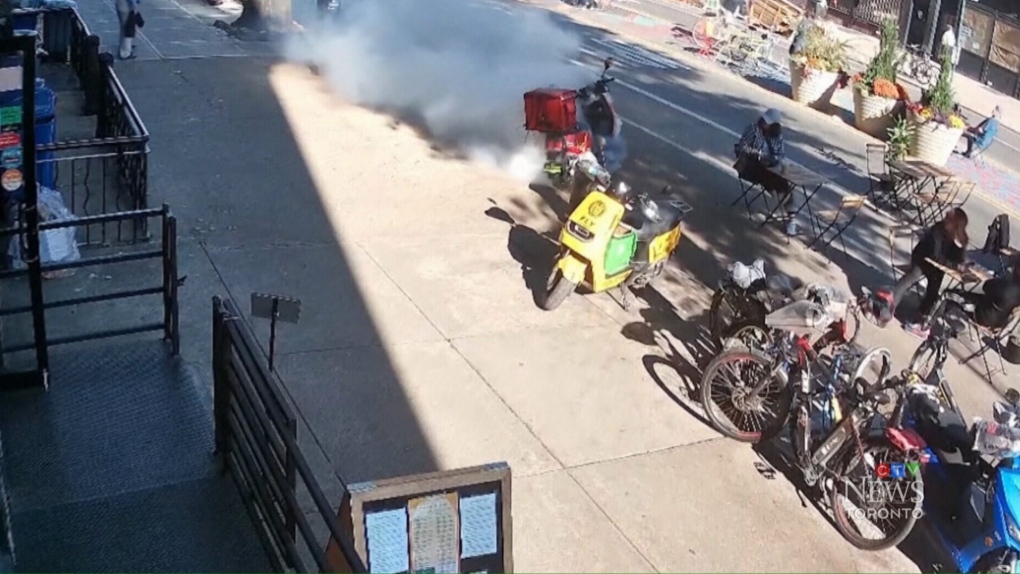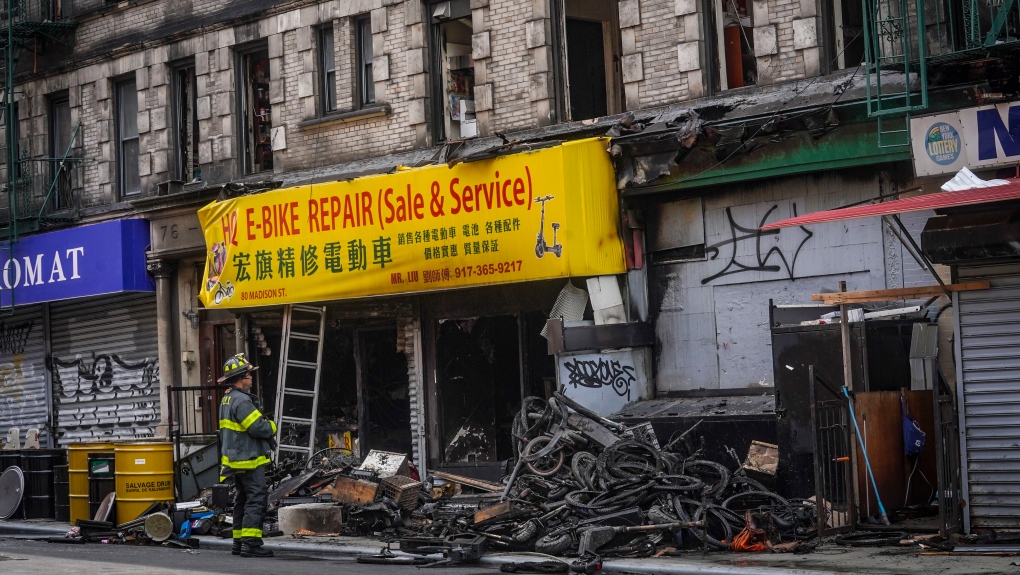Fires caused by lithium-ion batteries are on the rise across Canada, according to the organization that represents the country's fire chiefs, prompting warnings from fire services, injury lawyers and even Health Canada.
Toronto saw a 90 per cent increase in the number of fires involving the rechargeable batteries in 2023 — a total of 55 fires, up from 29 the previous year — and the batteries were one of the leading causes of fires in Vancouver that year.
It's a phenomenon Ken McMullen, president of the Canadian Association of Fire Chiefs, says fire services are reporting in cities big and small across the country, and most cases share a common origin.
"What we're seeing more so is on the e-mobility devices and the most common that come to mind are the e-bikes, e-scooters and electronic stand-up one-wheel devices," McMullen told CTVNews.ca in a phone interview on Tuesday.
'Extremely aggressive'
Lithium-ion batteries are rechargeable batteries used in electric cars, e-bikes, laptops and cellphones, as well as other electronics. They are more easily damaged than other types of batteries and can explode or burst into flames when damaged or improperly used, thanks to a process called thermal runaway.
The resulting fires, McMullen said, "are extremely aggressive and volatile in the sense that it happens very quickly."
Moreover, McMullen said they are often difficult to extinguish, and require specialized equipment and training that smaller, volunteer-run fire services sometimes lack.
"The reaction of a thermal fire is significantly different than that of what we have typically trained for," he said. "Industry and innovation is exceeding the pace with which the fire service can keep up."
 A Toronto e-bike retailer thinks regulations should change following a fire caused by a lithium-ion battery that erupted on the city's subway system over the weekend.
A Toronto e-bike retailer thinks regulations should change following a fire caused by a lithium-ion battery that erupted on the city's subway system over the weekend.
Batteries lacking standard Underwriter Laboratories (UL) and Conformite Europeenne (CE) international safety certifications, as well as those that have been overcharged, modified or otherwise misused, are especially prone to catching fire, McMullen warned.
"We believe part of the issue may be improper use (such as) overcharging of these batteries, or we are seeing these do-it-yourself type adjustments so they can get more speed or they can get more power, as well as mixing and matching of parts," he said. "These are just some of the examples of things we're seeing as being the causes of some of these fires."
In fact, Health Canada maintains a page dedicated to advising on the safe use of lithium-ion batteries, including a list of ways the batteries can be dangerously compromised through overcharging, undercharging, storing them in a hot or cold car or in direct sunlight, allowing the terminals to get wet, modifying the batteries, or using batteries that are swollen or dented.
"Modifying lithium-ion batteries can destabilize them and increase the risk of overheating, fire and explosion," the page reads.
'Catastrophic consequences'
The portable nature of devices that run on lithium-ion batteries means they can catch fire in a variety of enclosed places such as apartments, elevators, trains, subway cars and buses, putting everyone around them at risk, personal injury lawyer Nainesh Kotak warns.
"There could be catastrophic consequences because a lot of riders will take their e-bikes on public transit," Kotak told CTVNews.ca in a phone interview on Tuesday.
"The risk to the general public increases when you have many people grouped together. You could have catastrophic consequences if there is a fire. So it is an issue that certainly needs attention."
Vancouverite Kellyann Sharples is suing several makers of e-bikes and e-scooters following an apartment fire in 2022 in which her partner died, alleging the lithium-ion power cell in an e-bike started the fire, according to court papers filed in January.
And last December, Toronto subway riders had to evacuate a station after a lithium-ion battery on an e-bike suddenly caught fire.
Most recently, Metrolinx, which operates intercity transit in the Greater Toronto and Hamilton Area, enacted a ban on all lithium-ion batteries lacking UL or CE certification starting April 9. In doing so, the transit service joins a list of jurisdictions placing restrictions on lithium-ion battery-operated e-bikes, e-scooters and other mobility devices.
 A firefighter looks through debris in the aftermath of a fire which authorities say started at an e-bike shop and spread to upper-floor apartments, Tuesday June 20, 2023, in New York. (AP Photo/Bebeto Matthews)
A firefighter looks through debris in the aftermath of a fire which authorities say started at an e-bike shop and spread to upper-floor apartments, Tuesday June 20, 2023, in New York. (AP Photo/Bebeto Matthews)
In 2021, Transport for London banned e-scooters from the U.K. capital's network after a series of fires involving lithium-ion batteries.
New York City has also cracked down on unsafe e-bikes, with a new law prohibiting the sale, lease or rental of e-bikes that fail to reach recognized safety standards. Retailers will face fines of up to US$1,000 for each uncertified device that is found.
"There's now an understanding, and there's enough research that appears to be out there and enough statistics that are showing that, unfortunately, e-bikes or e-scooters with non-certified lithium-ion batteries are at risk of fire," Kotak said.
"That risk might be minute, it might be one-in-10,000, I don't know, but the fact is we do know there is a risk and we've seen fires and we've seen deaths."
With files from Alyse Kotyk, Alex Arsenych, Codi Wilson and Pat Foran











































